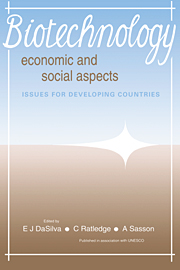Book contents
- Frontmatter
- Contents
- List of contributors
- Preface
- 1 Biotechnology: the socio-economic revolution? A synoptic view of the world status of biotechnology
- 2 Bioethanol production: economic and social considerations in failures and successes
- 3 Biofertilizers: agronomic and environmental impacts and economics
- 4 Microalgal biotechnology: is it an economic success?
- 5 Production of useful biochemicals by higher-plant cell cultures: biotechnological and economic aspects
- 6 Mushroom production – an economic measure in maintenance of food security
- 7 The economic viability of Single Cell Protein (SCP) production in the twenty-first century
- 8 The impact of biotechnology on international commodity trade
- 9 Biotechnology: socio-economic considerations, intercultural perspectives and international viewpoints
- 10 Joint microbial biotechnological ventures in developing countries: social promises and economic considerations
- 11 The economic and social implications of gene technology to developing countries
- 12 Making biotechnology appropriate – and environmentally sound
- 13 Information support for research and development in biotechnological applications
- 14 The effects of emerging biotechnologies on plant and animal agriculture – a viewpoint
- Index
4 - Microalgal biotechnology: is it an economic success?
Published online by Cambridge University Press: 04 August 2010
- Frontmatter
- Contents
- List of contributors
- Preface
- 1 Biotechnology: the socio-economic revolution? A synoptic view of the world status of biotechnology
- 2 Bioethanol production: economic and social considerations in failures and successes
- 3 Biofertilizers: agronomic and environmental impacts and economics
- 4 Microalgal biotechnology: is it an economic success?
- 5 Production of useful biochemicals by higher-plant cell cultures: biotechnological and economic aspects
- 6 Mushroom production – an economic measure in maintenance of food security
- 7 The economic viability of Single Cell Protein (SCP) production in the twenty-first century
- 8 The impact of biotechnology on international commodity trade
- 9 Biotechnology: socio-economic considerations, intercultural perspectives and international viewpoints
- 10 Joint microbial biotechnological ventures in developing countries: social promises and economic considerations
- 11 The economic and social implications of gene technology to developing countries
- 12 Making biotechnology appropriate – and environmentally sound
- 13 Information support for research and development in biotechnological applications
- 14 The effects of emerging biotechnologies on plant and animal agriculture – a viewpoint
- Index
Summary
Introduction
The potential uses of algal biomass for the benefit of mankind has been intensively reviewed in the last few years, resulting in several recent books and monographs (Borowitzka & Borowitzka, 1988; Richmond, 1986a,b; Lembi & Waaland, 1988). Rather than summarizing the available literature on algal biotechnology, the aim of this chapter is to present a personal view of the potential inherent in algal biomass production to become a viable economic enterprise, to review some of the economic studies which have been published and to point out the unique advantages that could make algal biotechnology a real economic success.
What is it all about?
Microalgae are aquatic microorganisms capable of carrying out the process of photosynthesis in the same way as higher plants. The main advantages of culturing microalgae as a source of biomass are as follows.
(1) Algae are considered to be the most efficient biological system for harvesting solar energy and for the production of organic compounds via the photosynthetic process.
(2) The entire biomass is available for harvest and use, as most algae are non-vascular plants and lack complex reproductive organs.
(3) Many species of algae can be induced to produce particularly high concentrations of chosen compounds – proteins, carbohydrates, lipids and pigments – that are of commercial value.
(4) Genetic selection and strain screening are relatively easy and quick as algae are microorganisms without a sexual stage, undergoing simple cell division and completing their life cycle within a few hours. This also allows a much more rapid development and demonstration of viable production processes than other agricultural processes.
[…]
- Type
- Chapter
- Information
- Biotechnology: Economic and Social AspectsIssues for Developing Countries, pp. 70 - 80Publisher: Cambridge University PressPrint publication year: 1992
- 2
- Cited by



